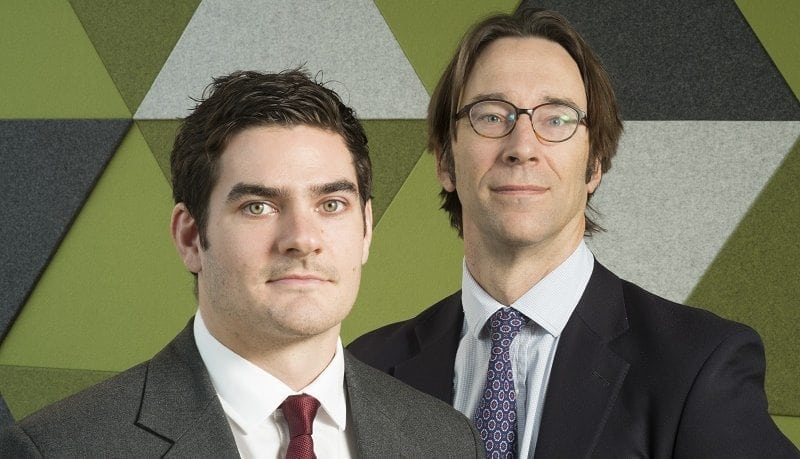On Tuesday, Whitmore and co-manager Dermot Murphy launched the Jupiter Global Value Equity fund, a Ucits version of the Sicav global value fund, which they took over from Gregory Herbert and Sebastian Radcliffe in October 2016, following a change in style.
The fund has a concentrated portfolio of around 40 undervalued companies around the world and has a degree of crossover with Whitmore’s existing UK fund, with top-10 holdings like Cisco, BP, Pearson, Aviva, Standard Chartered, Barclays and Ericsson Nikole Tesla appearing in the global vehicle. However, that product goes by the moniker UK Special Situations, a term Portfolio Adviser understands Jupiter is moving away from.
Whitmore stressed he wanted to launch a global value product at a time when it will benefit clients the most, while growth is still outperforming value. He says many investors retain an anti-value bias.
“There is a tendency for fund management groups to launch funds when that particular asset class has done very well whereas what we’re doing is completely the opposite,” he told Portfolio Adviser in an exclusive interview following the fund launch announcement.
“Value relative to growth has had its hardest 10-year period. There have only been two other periods that have been as bad – the depression of the late 20’s and the tech boom of the late 90’s. We’re trying to launch at a time when we think it’s going to be good for customers.”
Regardless, the Jupiter Global Value Sicav has returned 11.4% over one year compared 1.4% in the MSCI AC World, according to FE Analytics.
Contrarian move?
But increasingly there has been renewed talk of value making a comeback, with multi-asset manager Shaniel Ramjee from Pictet Asset Management recently deciding to jump on the value bandwagon, adding cyclical companies to his portfolios.
For a while now, analysts and investors have flagged the financials sector looks more attractive in a rising rate environment.
Nathan Sweeney, Architas senior investment manager, argues we have been seeing signs of a more “cohesive value momentum” with energy companies benefiting from a recovery in the oil price and “broad-based global growth” providing a boon to industrials.
One-year performance figures show the UK Special Situations fund fell 2.1% compared to the 11.4% returns delivered by the Sicav fund with the global mandate, according to FE Analytics.
Furthermore, Sweeney thinks that certain headwinds plaguing growth sectors like tech, such as increased regulatory scrutiny and possibly higher taxation, will reduce firms’ earnings potential and level the playing field between growth and value.
“Ultimately you will see markets focusing on good companies and those companies will appear on both the growth and value sides,” he says. “I expect you will see a closer divergence in terms of those performance differentials.”
For that reason, Whitmore’s decision to launch a global value strategy may not be as big of a gamble as he lets on, according to Sweeney.
“For Ben and his team of course it’s a good time to launch this because value has been out of favour for a while.
“I wouldn’t say it’s a huge gamble,” he continues. “Obviously having a product in place is a good thing because should value recover, they’ve got something they can distribute.”
Unloved global value
Still, Darius McDermott, managing director of Chelsea Financial Services, says that Whitmore’s latest venture is a welcome development given there are so few value-style global funds available to UK investors.
Looking through the list of value-style funds within the Investment Association universe, the vast majority are regionally specific products, with only a handful of firms, including Schroders, Jupiter and Robeco, currently running global value mandates.
Having a broader investment universe to choose from could prove advantageous for a value-style investor like Whitmore, Sweeney thinks.
“There are certain markets where value will do better. As a global fund manager, he has the opportunity to search around the globe, which gives him a better framework of managing a product than say someone in a specific region. A value manager in the US is probably going to have a harder time than a growth manager.”
McDermott agreed now was a good time to launch as value stocks continue to look “very cheap” and unloved.
“We did see a bit of a rally in value in 2016 but 2017 very much returned to growth again.
“He’s a very consistent, solid value manager and their Sicav has done quite well since they launched it in 2016, so I think this is an interesting time for people to look at it.”
Currently, McDermott said he has a “slight value tilt” in the portfolios he runs “but nothing aggressive because if you’re wrong, you can be very wrong”.
“If you said to me over the next 10 years do you think value will beat growth, I would say yes. But when and by how much – I don’t know.”










